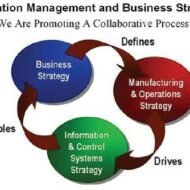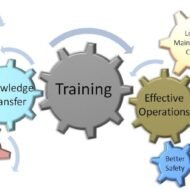Posted by Managementguru in Business Management, Operations Management, Principles of Management
on Feb 24th, 2014 | 0 comments

The management of conversion or transformation process which accepts inputs and delivers usable goods and services is what is called “operations management.” The inputs may be in the form of, capital, material, labor, technology, information, machines etc. The process takes place in an effective and efficient manner through operations planning, design, management and control. Don’t forget to download the 3 page Project Planner Printable at the end of this post 👇🏻 Absolutely Free Earlier it was called, production or manufacturing management. Since operation is a general term in a productive environment whose output may be goods or services, the term operations management has become more appropriate. The Aim of a Good Operational Management Would be High level of productivityCompetitive cost and qualityTimely deliveryProducing goods as per the requirements of the consumer, that is customer oriented.Flexibility and responsiveness in the production of goods and services Production or operation in the three important sectors of an economy, namely, agriculture, industry and service, creates national wealth and serves as an index for the growth of that economy. One has to understand the link between operations management and other functional areas to appreciate its scope. The goals of the operations strategy has to necessarily be in tandem with the overall corporate strategy to accomplish the goals of a firm. Scope of Operations Management From marketing department, cues regarding customer preference and market segmentation in terms of product, price and volume are supplied to the production department, based on which the production planning is concluded. From Research and development comes the product design and process technology. Human resource is an integral part of production process and also a crucial input. Man power planning by the human resource department plays a major role in recruiting, selecting, training, evaluating and empowering labor force. Operations Strategy The great diversity in products and services available in the market should be taken into consideration before deciding on your operations strategy. At one end we have custom made products that are designed and manufactured to suit the specific needs of the consumers. For instance, custom made shoes, shirts, suits, furniture etc. Here the emphasis is on quality and delivery where the customer is not very much bothered about the price. At the other end manufacturers go for highly standardized products that are available “off the shelf.” Say, home appliances, detergents, soaps etc., here the product differentiation is very minimal and the focus is on competitive pricing as the material is available in plenty. Economy of Scale A customized product would require a manufacturing set up that can handle a wide variety of general products. The sequence of operations for each product would vary in the manufacturing system making a customized product. So, a process oriented manufacturing system is designed, where similar facilities doing similar operations are grouped together and departmentalized. Standardized products go for a product focused manufacturing system, to reduce the “through put” time as large volumes are required. To be cost effective, each product should have a dedicated line of production to take advantage of the “economy of scale.” Intermediate types of products also find their place in the market and they are produced in a production layout that has a mix of product and process orientation. Here a whole range of products and services are created for the benefit of the customers. In a long term basis, manufacturers should aim to develop new technology, environmentally viable products, increase R and D activity, update skills of work force and managers and focus on development of new products, process and innovations....

Posted by Managementguru in Principles of Management, Training & Development
on Feb 22nd, 2014 | 0 comments

Benefits of Training to Employers The employers invest in training because they secure several benefits out of the exercise, which can be summed up as under: Faster learning of new skills Training aids the employers to lessen the learning time of their employees and accomplish higher standards of performance. The employees need not waste time in learning by observing others. If a formal training programme exists in the organization, the qualified instructors will help the new employees to acquire the skills and knowledge to do specific jobs quickly. Increased productivity Training increases the skill of the new employee in while performing a particular job. An increased skill level usually helps in increasing both quantity and quality of output. Training can be of great help even to the existing employees. It helps them to increase their level of performance on their present job assignments and prepares them for future assignments. Standardization of procedures Training can help the standardization of operating procedures, which can be learnt by the employees. Standardization of work procedures makes high levels of performance rule rather than exception. Employees work intelligently and make fewer mistakes when they possess the required know-how and skills. Lesser need for supervision. Trained employees need lesser supervision. Training does not eliminate the need for supervision, but it reduces the need for detailed and constant supervision. A well-trained employee can be self-reliant in his/her work because s/he knows what to do and how to do. Under such situations, close supervision might not be required. Economy of operations Trained personnel will be able to make better and economical use of the materials and the equipment and reduce wastage. Also, the trained employees reduce the rate of accidents and damage to machinery and equipment. Such reductions can contribute to increased cost savings and overall economy of operations. Higher morale The morale of employees is increased if they are given proper training. A good training programme shapes employees’ attitudes towards organizational activities and generates better cooperation and greater loyalty. With the help of training, dissatisfactions, complaints, absenteeism and turnover can also be reduced among the employees. Thus, training helps in building an efficient and co-operative work force. Managerial Development The top management can identify the talent, who can be groomed for handling positions of responsibility in the organizations. Newer talent increases the productivity of the organizations. By providing opportunity for self-development, employees put in their best effort to contribute to the growth of the...




